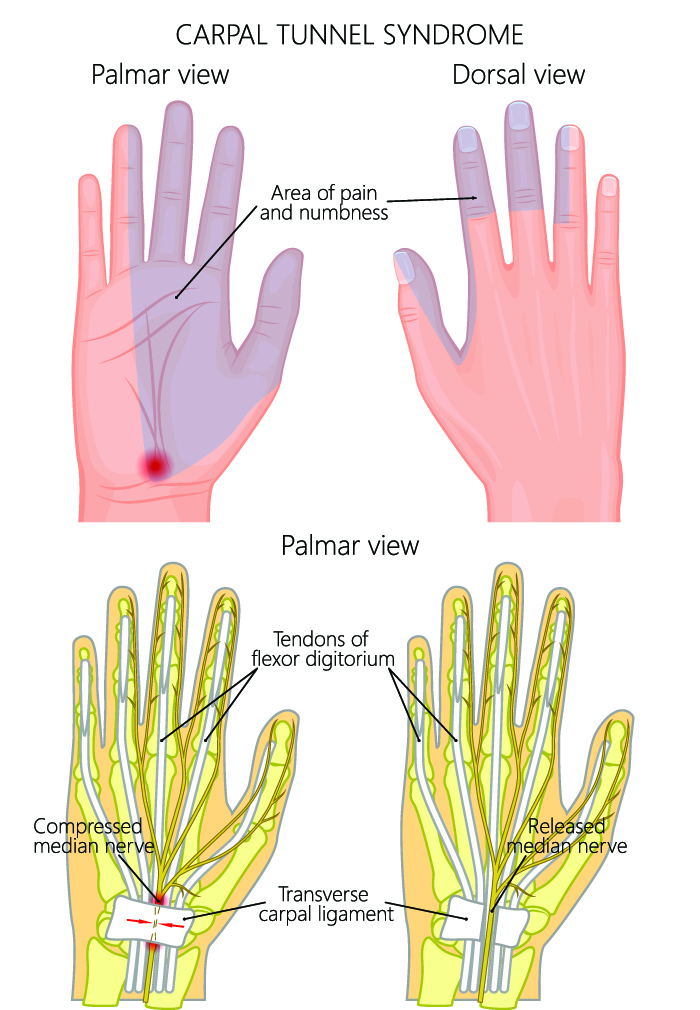Carpal Tunnel Syndrome Surgery in Koramangala, Bangalore
Carpal Tunnel Release is a surgery performed for the treatment of Carpal Tunnel Syndrome (CTS). The Syndrome is caused by repetitive motions of the hand or wrist, such as typing, twisting or any activity involving excessive wrist movement. It can also be caused by a sprain or a fracture.
Carpal Tunnel Syndrome is considered a chronic disorder. Studies have shown women have comparatively smaller carpal tunnels than men which makes them more likely to get affected by CTS.
To seek treatment, visit any of the orthopedic hospitals in Bangalore. Or search online for an orthopedic surgeon near me.

What is Carpal Tunnel Release?
Carpal tunnel is a narrow passageway in which tendons and median nerves are present, which allows fingers to move. Carpal tunnel is made up of wrist bones and ligaments. When this carpal tunnel is injured or any tissues present in it are damaged, then the median nerve gets squeezed, which in turn causes pain and numbness in the hand. To reduce pain and swelling in the hand, a Carpal Tunnel Release surgery is performed wherein a surgeon cuts the ligament that presses down the median nerve passing through the carpal tunnel. Through this surgery, the median nerve gets more space which eventually reduces pain and swelling in the hand.
What are the types of Carpal Tunnel Release?
Open and endoscopic surgeries are two main types of carpal tunnel surgery. In both cases, a small incision is made on the symptomatic hand through which the ligament that puts pressure on the median nerve is torn down. Doctors suggest one of the two depending on case severity.
What are the CTS symptoms?
Many people experience hand pain daily as a result of working for long periods at a computer or engaging in physical activities such as sports. Therefore many patients tend to ignore CTS symptoms. However, if not treated at an early stage, conditions may worsen. Some early-stage symptoms include:
- Numbness
- Pain
- Swelling
- Tingling
- Weakness in hand
At night, many people sleep on their hands with their wrists bent, this may also lead to pain in the arm. Buttoning clothes or tying shoelaces may prove to be difficult due to weakness in the hand.
What are the causes of Carpal Tunnel Syndrome?
Apart from excessive and repetitive use of wrists, other causes are:
- Dislocation of the wrist bone
- Pregnancy
- Diabetes
- Thyroid dysfunction
- High blood pressure
- Rheumatoid arthritis
- Menopause
- Obesity
- Heredity
When do you need to see a doctor?
Wrist pain may seem common, but if unchecked, it can affect quality of life. Before opting for Carpal Tunnel Release surgery, try:
- Changing lifestyle
- Over-the-counter medication
- Physical therapy
- Taking a break from typing for long hours
After trying all these remedies, if the pain doesn’t go away, consult a doctor.
Request an appointment at Apollo Spectra Hospitals, Koramangala, Bangalore.
Call 1860 500 2244 to book an appointment.
What are the risk factors to consider before Carpal Tunnel Release surgery?
These can include:
- Loss of wrist strength
- Nerve damage
- Pain of the scar for weeks
- Bleeding
- Infection
How do you prepare for the Carpal Tunnel Release surgery? What happens during the surgery?
Before performing the surgery, doctors may examine the patient through:
- Physical examination
- X-Ray
- Electromyography
The surgery typically takes about 15 minutes. Anesthesia is administered to the patient to reduce the pain. Once the operation is done, doctors stitch back the openings made on the wrist. A large bandage is then put on the operated part to keep it protected. Recovery may take a few months.
Conclusion
Carpal Tunnel Release is performed to cure excruciating wrist and hand pain felt while performing daily activities. Strictly follow your doctor’s instructions before and after the surgery.
Doctors will prescribe pain killers.
While taking a bath, cover the operated hand with a plastic wrapper, the dressing should not get wet. Specific advice will be given by your doctor.
High inflammatory foods like sugar and fried items should be strictly avoided. Sodium-rich diet may help reduce fluid retention in the wrist.
Symptoms
Treatments
Our Top Specialities
NOTICE BOARD
CONTACT US
CONTACT US
 Book Appointment
Book Appointment


.svg)
.svg)
.svg)
.svg)








